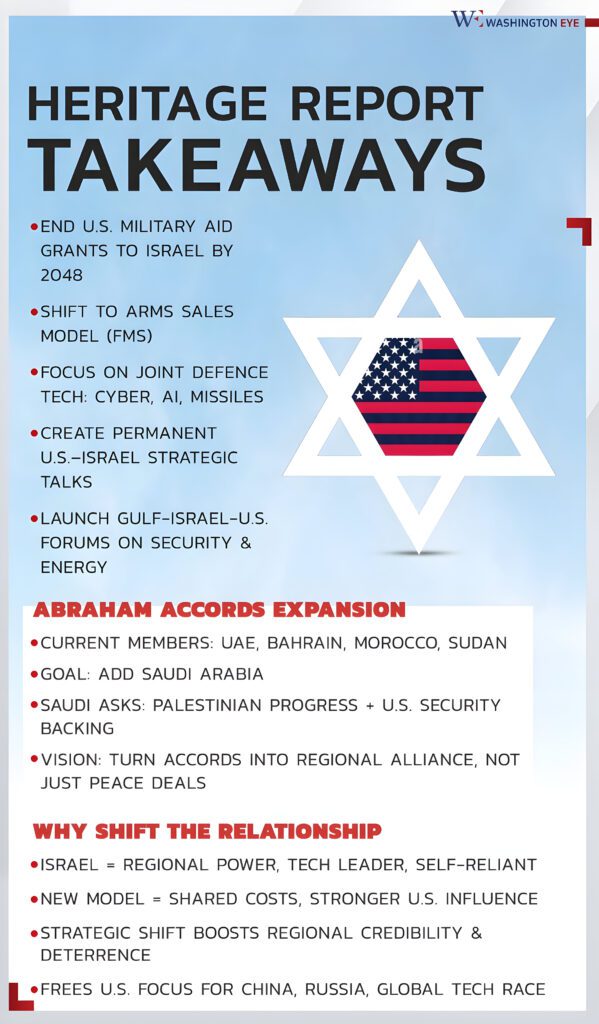The Middle East stands at a pivotal moment. From the war-ravaged streets of Gaza to the strategic corridors of Washington and Tel Aviv, the world is watching a region teeter on the edge of transformation. Behind the headlines of missile strikes, diplomatic breakdowns, and resurgent regional rivalries lies a deeper question: Can the United States and Israel redefine their special relationship into one that serves both nations—and the broader Middle East—in the decades to come?
That question forms the heart of a new policy blueprint released by The Heritage Foundation, titled “U.S.-Israel Strategy: From Special Relationship to Strategic Partnership, 2029–2047.” In 65 pages of sweeping strategic insight, the report calls for a bold evolution in the U.S.-Israel alliance, one that moves beyond aid dependency toward a mature, equal partnership based on shared interests and capabilities. Against the backdrop of an increasingly unstable region, the report’s recommendations feel less like an abstract vision and more like an urgent roadmap.
A Region in Turmoil
The timing of the report is no coincidence. Since Hamas launched its attack on Israel on October 7, 2023, killing approximately 1,200 Israelis and taking over 250 hostages, the region has once again spiralled into open warfare. Israel’s military response has been overwhelming. Its stated goal: dismantle Hamas and rescue the hostages. The toll has been catastrophic. More than 50,000 Palestinians are estimated to have been killed. Infrastructures across Gaza lie in ruins. Nearly two million people have been displaced. The scale of the conflict has stunned even longtime observers of the region.
Beyond Gaza, the war has spilled into neighbouring Lebanon and Syria, with Hezbollah launching rockets and Israel responding with airstrikes deep into Beirut’s southern suburbs. In Yemen, the Iran-backed Houthis have entered the fray, targeting Israel and U.S. assets in the Red Sea. The United States, under President Donald Trump’s second administration, has responded forcefully, launching a new wave of airstrikes and dispatching a second aircraft carrier to the region.
This regional unraveling underscores a point made forcefully in the Heritage report: the nature of the U.S.-Israel relationship must evolve in response to geopolitical shifts. Israel is no longer a fledgling state dependent on American protection. It is a regional superpower, with one of the world’s most advanced militaries, a thriving tech sector, and deep diplomatic ties.
Billions in Aid, But to What End?
In the months following the October 2023 attack, the U.S. Congress approved over $17.9 billion in additional military aid to Israel. This is the largest one-year support package since the Eisenhower era. It includes ammunition resupplies, Iron Dome interceptors, precision-guided munitions, and intelligence-sharing operations. For Washington, the aid symbolises unwavering support. For critics, it raises urgent questions: Is this level of aid sustainable? Does it incentivize long-term solutions or enable short-term escalation?
The Heritage Foundation doesn’t propose a sudden withdrawal of American support. Rather, it suggests a structured transition. By 2048—a symbolic year marking Israel’s centenary—the U.S. should phase out Foreign Military Financing (FMF) and instead engage Israel through Foreign Military Sales (FMS). This shift would make Israel a paying partner in U.S. defence procurement rather than a subsidized recipient. The benefits? More balanced burden-sharing, strengthened U.S. industrial interests, and a partnership grounded in capability, not charity.
Trump’s Return and the Future of the Abraham Accords
President Trump’s re-election in 2024 has reignited momentum around the Abraham Accords. These landmark agreements, brokered during his first term, normalised relations between Israel and several Arab states, including the UAE, Bahrain, Morocco, and Sudan. But the real prize remains elusive: Saudi Arabia.
The Heritage report notes that integrating Saudi Arabia into the Accords could be the key to lasting regional stability. Riyadh has signalled conditional openness, demanding tangible progress on the Palestinian issue and credible security guarantees from Washington. The Trump administration, eager to secure a diplomatic legacy, has reportedly intensified its efforts, but progress remains elusive.
Here, the report makes a profound point: the Abraham Accords must be more than bilateral deals. They should evolve into a regional framework that aligns Israel’s integration with Palestinian state-building. A U.S.-Israel strategic partnership should facilitate, not obstruct, this process. Otherwise, the peace dividends risk being short-lived.
Strategic Maturity Over Tactical Dependency
To understand why this moment matters, one must see the evolution of the U.S.-Israel relationship. Since 1948, American support for Israel has been driven by shared values, strategic necessity, and domestic political consensus. That support has included over $150 billion in military and economic aid—more than to any other nation.
But relationships must grow. As the report argues, a truly strategic alliance must be defined by reciprocity. The future of the U.S.-Israel partnership should be based on joint defence production, intelligence cooperation, and joint R&D in emerging tech fields like cybersecurity, AI, and missile defence.
Israel is well-positioned to be that kind of partner. It is a leading innovator in drone warfare, missile defence systems (like Iron Dome and David’s Sling), and cyber resilience. With regional threats evolving from state armies to proxy militias and digital warfare, a strategic U.S.-Israel alliance should focus on co-developing technologies that secure both nations.
Rebalancing Without Receding
Critics of rebalancing often argue that reducing aid sends the wrong signal to Israel’s enemies. The Heritage report disagrees. It asserts that strategic maturity enhances deterrence. When Israel is seen not as an American client, but as a peer and partner, it commands greater respect. Similarly, U.S. leadership in the Middle East doesn’t stem solely from dollars spent, but from ideas advanced and coalitions built.
The report proposes several pragmatic steps. First, launch a joint U.S.-Israel Strategic Dialogue focused on long-term planning. Second, establish a trilateral forum with Gulf partners to align missile defence, intelligence sharing, and energy security. Third, leverage the Abraham Accords to create a regional security architecture that complements NATO’s Mediterranean Dialogue.
Palestinian Statehood and Regional Credibility
One area where the report treads carefully—but no less critically—is the Palestinian issue. It acknowledges that no strategic partnership can endure if Washington is seen as indifferent to Palestinian suffering. This doesn’t require abandoning Israel. It requires recognising that regional peace and U.S. credibility demand a viable political horizon for Palestinians.
To that end, the U.S. should push for pragmatic governance reforms in the Palestinian Authority, incentivize anti-corruption measures, and condition aid on accountability. Simultaneously, Washington should press Israel to freeze settlement expansion and ease humanitarian conditions in Gaza and the West Bank. These steps won’t solve the conflict overnight, but they would create space for diplomacy—and signal that the U.S.-Israel relationship is consistent with international norms.
A Future Worth Building
The Heritage Foundation’s proposal isn’t radical. It is realistic. It recognises Israel’s transformation from dependent state to empowered ally. It acknowledges that U.S. resources must be used strategically, especially in an era of great-power competition with China and Russia. And it argues, persuasively, that lasting peace in the Middle East won’t come from checkbooks alone.
The Gaza war, the spectre of a multi-front conflict, and the risk of regional escalation underscore the need for a new kind of U.S. leadership. President Trump’s second administration, having inherited both the momentum of the Abraham Accords and the burden of new conflict, has an opportunity to redefine legacy.
The path forward lies not in sentimentality but in strategy. The U.S.-Israel relationship must evolve from a historic bond to a future-focused partnership. One that leads by example, defends shared values, and recognises that in diplomacy—as in life—the most enduring relationships are those that grow together.
The moment to begin that journey is now.













